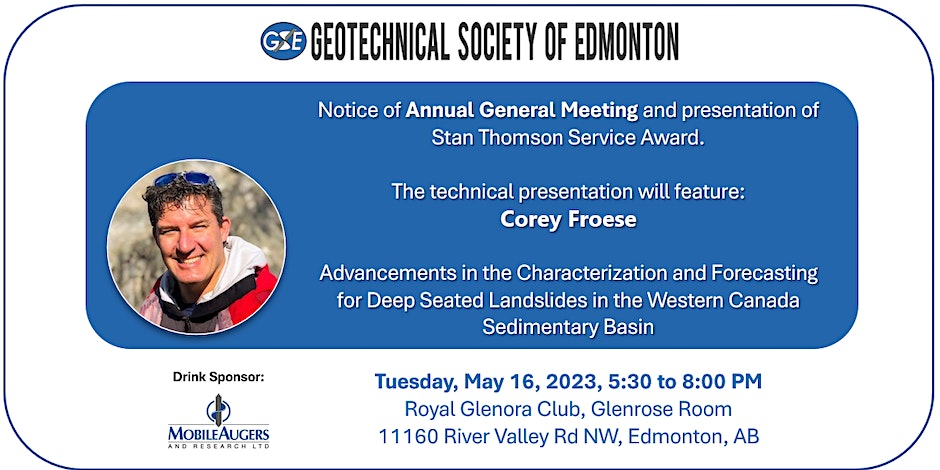The Geotechnical Society of Edmonton is pleased to present the welcome Corey Froese, P.Eng., as the keynote speaker for our Annual General Meeting.
Date: May 16, 2023
Time: 5:30pm – 9:00pm
Location: Glenrose Room, Royal Glenora Club, 11160 River Valley Road, Edmonton
Cost: GSE/CGS Members $25, Students $10, Non-members $30
Business affairs of the Geotechnical Society of Edmonton will occur at this meeting. GSE Members may put forth a motion to be discussed. AGM documents will be available at the Google Drink link here: GSE 2022-2023 AGM Documents
Note: We are exploring options to host this event virtually for out of town attendees. A virtual option will be posted on the EventBrite page once finalized.
Agenda:
5:30 Registration
6:00 Dinner
6:45 Annual General Meeting
7:30 Technical Presentation
8:30 Networking
Click to register on EventBrite
Abstract
While the state of landslide early warning systems (LEWS) is quite advanced in jurisdictions where shallow and rapid slides occur in relation to precipitation events, the same cannot be said for deeper seated episodically moving landslides in weak bedrock and glacial sediments. Although these deep seated landslides (DSL’s) do not typically lead to loss of life, a recent study by Porter et al (2019) has provided a lower bound estimate of $ 400 millions per year that is spent by asset owners mitigating DSL-related damage. A number of pipeline operators with assets in the WCSB have provided crowd-sourced funding and data to support the development of spatial and temporal quantitative relationships between hydroclimate and landslide activity across the WCSB. This project has involved collection and organization of displacement data from over 100 slopes across the region, and mining of displacement data from satellite-based InSAR. This data has been integrated with a global data model for various hydroclimatic parameters (e.g. snow melt, precipitation, soil moisture) to begin to derive relationships between hydroclimate and landslide activity over the past 50 years. Initial findings are providing confidence around the ability to better forecast landslide activity changes over various time periods to support decision making for asset managers over annual, multi-year and decadal timeframe. It is expected that upcoming advances in the availability of regional displacement monitoring data will greatly improve these capabilities.
Biography
Corey Froese is the Principal Geological Engineer with Wavelength Advisory Services in Edmonton, Alberta, and has over 29 years of experience in the field of geological hazard risk management and decision support across North American and Europe. Since 2020, Corey has provided technical leadership for a BGC Engineering team of geological engineers, remote sensing, and data science specialists with a primary focus on the characterization of complex landslides and their impact on infrastructure and development. This includes the integration of earth observation and cloud-based earth science data to support data-driven analytics to support understanding. Since 2003, Corey has also focused on the application of remote sensing technologies to map and understand ground deformations. Over this time, he has provided technical advice and collaborated with the Canadian Space Agency and European Space Agency and is utilized for technical advice by both the Canadian Government and NASA in the field of satellite InSAR for mapping ground deformations. Corey has been actively involved with the Canadian Geotechnical Society and Geotechnical Society of Edmonton for over 25 years in the capacity as GSE Student Member (1997/1998) chair of the CGS’s Engineering Geology Division (1999-2002) and Landslide Committee (2008-2012), technical chair of the 2003 Geohazards conference, technical chair of the 2008 CGS conference, and chair of the 2012 International Symposium on Landslides. Corey has also been honored by the CGS with both the 2003 A.G. Stermac Award and the 2010 Canadian Geotechnical Colloquium.

